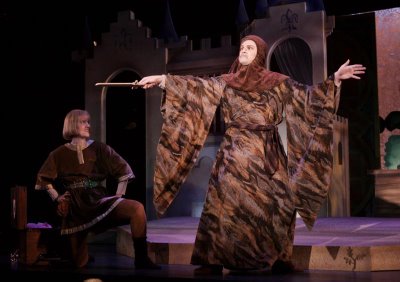Frolics and Frippery: A Roll in the Hay with Rossini
This review comes from guest contributor Richard K. Fitzgerald. This evening I attended Le Comte Ory -- composed by Gioacchino Rossini, libretto by E. Scribe and C. G. Delestre-Poirson, after their own play -- at the Barns at Wolf Trap. Upon entering the theater (the first time for me, incidentally), I was immediately impressed with the intimacy and warmth of the room. Its rustic and monochromatic qualities were a welcome juxtaposition to the colorful, cartoon-like set before my eyes. The stage was bursting with brilliant colors, all of which were adroitly fused by light shed on an abstract backdrop, curiously modern in contrast. The set's multi-dimensional appearance also added great depth to the stage, providing the illusion of something made larger than it actually is. Chuck Hudson put his concept for the aesthetic approach of the production quite succinctly in his Director's Notes:
This evening I attended Le Comte Ory -- composed by Gioacchino Rossini, libretto by E. Scribe and C. G. Delestre-Poirson, after their own play -- at the Barns at Wolf Trap. Upon entering the theater (the first time for me, incidentally), I was immediately impressed with the intimacy and warmth of the room. Its rustic and monochromatic qualities were a welcome juxtaposition to the colorful, cartoon-like set before my eyes. The stage was bursting with brilliant colors, all of which were adroitly fused by light shed on an abstract backdrop, curiously modern in contrast. The set's multi-dimensional appearance also added great depth to the stage, providing the illusion of something made larger than it actually is. Chuck Hudson put his concept for the aesthetic approach of the production quite succinctly in his Director's Notes:
As we began to research the production with the design team, we focused on the devotional work seen in medieval illuminated manuscripts. The human figures encompass a disproportionately large scale within smaller arches and buildings, which seemed a perfect setting for these "larger than life" characters, and for the intimate stage at the Barns. The sets, lights, and costumes become partners in the action, and their creation demanded a level of virtuosity from the designers we find in Japanese Kabuki Theater.The opera begins with a brief overture that leads directly into the first scene. Conductor Robert Wood led a brisk, supportive, unobtrusive, nicely balanced ensemble. The rest of the orchestra managed to overcome the absence of ensemble and intonation from that of the upper strings. As is typical in Rossini's operas, the orchestra doesn't have all that challenging of a role, relatively speaking, of course. In essence, the function of the orchestra is to provide accompaniment motifs and harmonic support, whereas in the operas of Wagner, for example, the orchestra takes on a much more aggressive and involved role. In this work, the quality of orchestration and instrumental passages do not generate a wealth of interest. Rather, the opera relies on its comical elements, beautiful melodies, and the virtuosity of those who sing it in order to stay afloat.
Mark J. Estren, Wolf Trap Opera: 'Le Comte Ory' (Washington Post, July 17) T. L. Ponick, Funny, fast-paced 'Ory' (Washington Times, July 17) |
This depiction of Le Comte Ory is very satisfying to take in. In the intimate setting of the Barns, one gets caught up in the production's contagious energy. I'm hesitant to go to a theater that is small and intimate, for fear of awkwardness generated by embarrassment felt for the cast if the performance falls short of what it should be. Everything in this production, however, seemed totally organic. I thought the stage direction/blocking seemed very natural; the fewer people on stage, the more the movement seemed to be improvised. The plot isn't worth mentioning here. One can almost guess the conflict in a Rossini opera: two individuals jousting for supremacy over the one with whom they are both in love (or lust). As silly as comic opera can be, the evening was well spent, full of frolics and frippery. I heartily recommend seeing the fourth and final performance tomorrow, July 23, 2 pm.





















































No comments:
Post a Comment